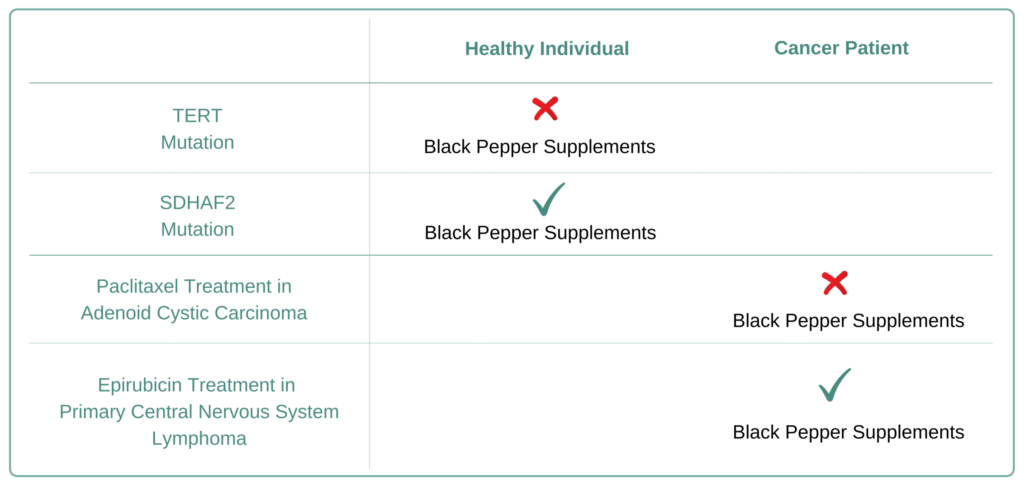Highlights
Nutritional supplements like Black Pepper have many health benefits and are being widely used by cancer patients and those at-genetic-risk of cancer. But, is it safe to take Black Pepper supplements for all types of cancer and without considering any ongoing treatments and other lifestyle conditions? A common belief but only a myth is that anything natural can only benefit me or do no harm. As one example, the use of grapefruit with certain medications is not recommended. Another example, the use of spinach with some blood thinning medications can cause adverse interactions and should be avoided. For cancer, nutrition which includes the food and natural supplements has been shown to influence outcomes. Hence a frequently asked question by cancer patients to dieticians and doctors is “What Should I eat and What Should I Avoid?”.
Taking nutritional Black Pepper supplements can benefit cancer patients with Primary Central Nervous System Lymphoma (PCNSL) on Epirubicin treatment. But avoid Black Pepper supplements if on Paclitaxel treatment for Adenoid Cystic/Adenocystic Carcinoma. Similarly, taking nutritional supplement Black Pepper can benefit healthy individuals who are at genetic risk of cancer due to mutation of gene SDHAF2. But avoid taking nutritional supplement Black Pepper when at genetic risk of cancer due to mutation of gene TERT.
The takeaway being – your individual context will influence your decision if nutritional supplement Black Pepper is safe or not. And also that this decision needs to be constantly revisited as conditions change. Conditions like cancer type, current ongoing treatments and supplements, age, gender, weight, height, lifestyle and any genetic mutations identified matter. So a legitimate question for you to ask for any recommendation of food and natural supplement is how it is related to your individual context.
Brief Overview
Nutritional supplements – vitamins, herbs, minerals, probiotics, and other specialty categories are increasing. Supplements are high concentrations of active ingredients which are also found in different foods. The difference being foods contain more than one active ingredient at lower diffused concentrations. Remember that each of these ingredients has its own science and biological mechanism at molecular level – hence choose the right combination of supplements like Black Pepper based on individual context and conditions.

So the question is should you take supplement Black Pepper? Should you take it when at genetic risk of cancer for mutation of gene TERT? Should you take it when at genetic risk of cancer for mutation of gene SDHAF2? Should you take it when diagnosed with Adenoid Cystic/Adenocystic Carcinoma? Should you take Black Pepper supplement when diagnosed with Primary Central Nervous System Lymphoma (PCNSL)? Should you take it when on Paclitaxel treatment? Should you continue taking it if you change your treatment from Paclitaxel to Epirubicin? So a general explanation like – it is natural or it increases immunity may not be acceptable and sufficient for choosing Black Pepper.
Cancer
Cancer remains an unsolved problem statement. The improved availability of personalized treatments and monitoring of cancer via blood and saliva have been significant factors to improve outcomes. The earlier the intervention – the better the influence on outcome. Genetic testing has the potential to assess cancer risk and susceptibility early. But besides regular monitoring in most cases there are no therapeutic intervention options available. After diagnosis with cancer such as Adenoid Cystic Carcinoma or Primary Central Nervous System Lymphoma, the treatments get personalized to tumor genomics and factors like staging of disease, age and gender. During cancer remission (after treatment cycle is complete) – monitoring is used for assessment of any relapse and accordingly decide next steps. A large majority of cancer patients and those at-risk do take nutritional supplements like Black Pepper.
So the question is that are all genetic mutation risks and types of cancers to be considered as one when deciding the use of Black Pepper? Are the biochemical pathway implications of genetic risk for cancer due to mutation of gene TERT the same as due to mutation of gene SDHAF2? Are the implications of taking Black Pepper for Adenoid Cystic Carcinoma same as Primary Central Nervous System Lymphoma (PCNSL)? Is it one and the same if you are on treatment with Paclitaxel or on Epirubicin?
Black Pepper – A Nutritional Supplement
Black Pepper, also known as Piper Nigrum, belongs to the Piperaceae family. The fruit of Black Pepper is also known as peppercorn which is dried and used as spice. Some of the reported benefits of consuming black pepper are : (Murlidhar Meghwal et al, Phytother Res., 2013)
- Rich is antioxidant
- Possesses anti-inflammatory effect
- Possesses immune modulatory effect
- Increase absorption and bioavailability of drugs and herbs inside the body.
- Reduces asthma
- Lowers cholesterol (Gabriel A Agbor at al, Food Chem., 2012)
- Controls blood sugar (Chetna Kharbanda at al, Chem Biol Drug Des. 2016)
- Possesses anticancer properties (Azadeh Manayi et al, Curr Med Chem ,2018)
Black Pepper supplements contain many active ingredients including Piperine, Retinol, Vitamin C and Folic Acid at different concentration levels. The molecular pathways which are regulated by Black Pepper include Focal Adhesion, Cell Cycle, Nucleotide metabolism, Stem Cell Signaling and NFKB Signaling. These cellular pathways directly or indirectly regulate specific cancer molecular endpoints like growth, spread and death. Because of this biological regulation – for cancer nutrition, the right choice of supplements like Black Pepper individually or in combination is an important decision to be made. When making decisions on the use of supplement Black Pepper for cancer – do consider all these factors and explanations. Because just as true for cancer treatments – Black Pepper use cannot be a one-size-fits-all decision for all types of cancers.
Choosing Black Pepper Supplements for Your Cancer
The reason there is no easy way to answer the question “When should I avoid Black Pepper for Cancer” is because “It Depends!”. Just like the same treatment does not work for every cancer patient, based on your individual context the Black Pepper may be harmful or safe. Along with which cancer and associated genetics – the ongoing treatments, supplements, lifestyle habits, BMI and allergies are all factors deciding if Black Pepper should be avoided or not and why.
1. Will Black Pepper Supplements benefit Cancer Patients with Adenoid Cystic/Adenocystic Carcinoma undergoing Paclitaxel treatment?
Adenoid Cystic/Adenocystic Carcinoma is characterized and driven by specific genetic mutations like NFIB and MYB leading to biochemical pathway changes in Focal Adhesion, PI3K-AKT-MTOR Signaling, Notch Signaling and Cholesterol Metabolism. A cancer treatment like Paclitaxel works through a specific pathway mechanism of action. The goal is to have a good overlap between the treatment and cancer driving pathways for a personalized approach which is effective. In such a condition any food or nutritional supplement which has a contrary effect to the treatment or reduces the overlap should be avoided. As an example, Black Pepper supplement should be avoided for Adenoid Cystic/Adenocystic Carcinoma along with treatment Paclitaxel. Black Pepper supplement impacts pathways/processes like Focal Adhesion which either promote drivers of the Adenoid Cystic/Adenocystic Carcinoma and/or nullify the treatment effect. Additionally, Black Pepper supplements contain active ingredients like Piperine which has CYP2C8 and CYP3A4 interaction with the Paclitaxel treatment, and hence should be avoided. (Pius S. Fasinu et al, Front Oncol., 2019; Food and Drug Administration, Mhaske et al., Pharm Anal Acta, 2018) Some of the factors which should be considered when choosing nutrition are type of cancer, treatments and supplements being taken currently (if any), age, gender, BMI, lifestyle and any genetic mutation information (if available).
2. Will Black Pepper Supplements benefit Cancer Patients Primary Central Nervous System Lymphoma (PCNSL) undergoing Epirubicin Treatment?
Primary Central Nervous System Lymphoma (PCNSL) is characterized and driven by specific genetic mutations like MYD88 and CD79B leading to biochemical pathway changes in Cell Cycle, NFKB Signaling, Apoptosis, B Cell Receptor Signaling and RAS-RAF Signaling. A cancer treatment like Epirubicin works through specific pathway mechanisms. The goal is to have a good overlap between the treatment and cancer driving pathways for a personalized approach. In such a condition any food or nutritional supplement which has a compatible effect to the treatment or reduces the overlap should be considered. As an example, Black Pepper supplement should be considered for Primary Central Nervous System Lymphoma (PCNSL) along with treatment Epirubicin. Black Pepper supplement impacts pathways/processes like Cell Cycle and NFKB Signaling which either obstruct drivers of the Primary Central Nervous System Lymphoma (PCNSL) and/or improve the treatment effect.
Foods to Eat After Cancer Diagnosis!
No two cancers are the same. Go beyond the common nutrition guidelines for everyone and make personalized decisions about food and supplements with confidence.
3. Are Black Pepper Supplements Safe for Healthy Individuals with TERT Mutation Associated Genetic Risk?
Different companies offer panels of genes to be tested for assessing genetic risk to different cancers. These panels cover genes associated with cancers of the breast, ovary, uterus, prostate, and gastrointestinal system and others. Genetic testing of these genes may confirm a diagnosis and help guide treatment and management decisions. Identification of a disease-causing variant may also guide testing and diagnosis of at-risk relatives.
TERT is one of the genes generally available in panels for cancer risk testing. TERT mutation causes biochemical pathways Nucleotide metabolism, MAPK Signaling, Stem Cell Signaling, Hypoxia and RUNX Signaling to get impacted. These pathways are direct or indirect drivers of cancer molecular endpoints. Black Pepper should be avoided when the genetic panel identifies mutation of TERT for Hematological Cancer. Black Pepper supplement impacts pathways/processes like Nucleotide metabolism and MAPK Signaling and creates adverse effects with TERT and related conditions.
4. Are Black Pepper Supplements Safe for Healthy Individuals with SDHAF2 Mutation Associated Genetic Risk?
SDHAF2 is one of the genes available in panels for cancer risk testing. SDHAF2 mutation causes biochemical pathways Stem Cell Signaling, Hypoxia, Carbohydrate Metabolism, MAPK Signaling and Angiogenesis to get impacted. These pathways are direct or indirect drivers of cancer molecular endpoints. Consider taking Black Pepper supplement when the genetic panel identifies mutation in SDHAF2 for Thyroid Cancer and Neuroendocrine Cancer. Black Pepper impacts pathways/processes like Stem Cell Signaling and Hypoxia and creates a supportive effect in those with SDHAF2 and related conditions.

* Other Factors are also included like BMI, Treatments, Lifestyle Habits
In Conclusion
The two most important things to remember are that cancer treatments and nutrition are never the same for everyone. Nutrition which includes food and nutritional supplements like Black Pepper, is an effective tool which can be controlled by you, while facing cancer.
What food you eat and which supplements you take is a decision you make. Your decision should include consideration of the cancer gene mutations, which cancer, ongoing treatments and supplements, any allergies, lifestyle information, weight, height and habits.
The nutrition planning for cancer from addon is not based on internet searches. It automates the decision making for you based on molecular science implemented by our scientists and software engineers. Irrespective of whether you care to understand the underlying biochemical molecular pathways or not - for nutrition planning for cancer that understanding is needed.
Get started NOW with your nutrition planning by answering questions on the name of cancer, genetic mutations, ongoing treatments and supplements, any allergies, habits, lifestyle, age group and gender.

Personalized Nutrition for Cancer!
Cancer changes with time. Customize and modify your nutrition based on cancer indication, treatments, lifestyle, food preferences, allergies and other factors.
Cancer patients often have to deal with different chemotherapy side effects which affect their quality of life and look out for alternative therapies for cancer. Taking the right nutrition and supplements based on scientific considerations (avoiding guesswork and random selection) is the best natural remedy for cancer and treatment related side-effects.
